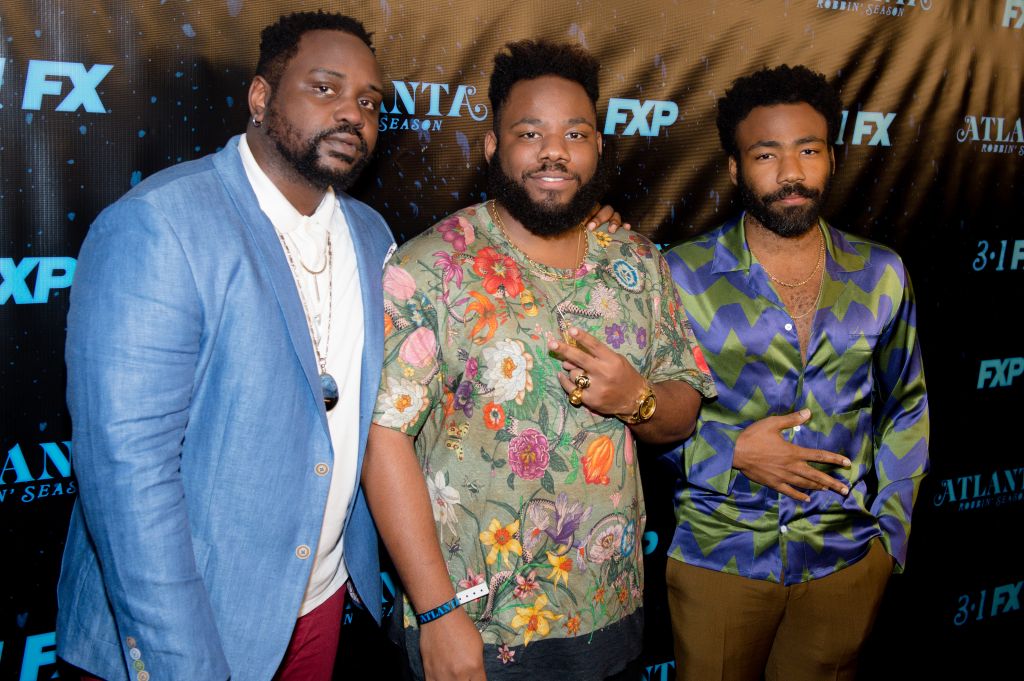
Source: Marcus Ingram / Getty
Watching Donald Glover’s Atlanta is, as David Simon called it, “luxurious.” Not for the craft of television it presents, which vectors toward the hilariously tragic, but because Black life is a surrealist landscape dotted with danger at every turn — and that’s where the show borrows its absurdity. Episode 1 of Season 2 only confirms that reality, again hilariously, as Kat Williams’ character ends up running through the neighborhood in his britches, his precious alligator let out into the yard to distract two cops.
“Robbin Season” is upon us as the show states, and everybody’s got to eat. But it’s who is eating at the table of Atlanta that’s most interesting: Black people. As other shows present the idea of Black life through a translation layer of whiteness, Glover’s show acts as though you already have it, beguiling you into a false sense of security. Allowing you to indulge in the fiction of your ability to watch the show without pretense, as though you were watching Twin Peaks or The X-Files, but weirder.
That security isn’t something to take for granted. It’s one that’s almost never present in a show about Black people. And part of the reason this show is so good is the idea that Atlanta won’t sell you out. That you’re, at best, all in this together, with Earn, Paper Boi, and Darius plunging through the looking glass with you, searching for a way out. What they’re running from and toward is twofold: How can you find stories that up-the-ante on the premise, which is that being Black in America is a bizarre and noxious reality, and yet there is nowhere else (here’s to holding out hope Wakanda comes along), and that the characters are worth investing in
Because Atlanta breaks nearly every convention about the traditional 30 minute show there is. Each episode doesn’t end in a neat climax. The characters are shuffling around with no real objective to speak of. The stories themselves are vignette-like exposés against such shuffling— an advertisement against that much wasted time. But instead of having its moods and feelings disperse into the atmosphere, Atlanta congeals around its obfuscation, eventually leading us to revelatory emotional moments, heightened by the sense of dread that reality in these times belches into the sky. I don’t need to list them all here. They are too numerous to name, anyway. Suddenly though, dystopia is the mood of the hour, and what is more dystopian than Black life expertly depicted, its trials and trivialities all adding up to something epi-phenomenal?
If the first episode is any indication, we can expect our characters to move gingerly down the rabbit hole while dragging us along for the ride. As Jordan Peele told the New Yorker for Glover’s recent profile, “For black people, ‘Atlanta’ provides the catharsis of ‘Finally, some elevated black shit.’ ” Yeah, finally. But it’s movement is becoming more than that. Each episode is beginning to reveal Earn as Glover in emotional drag, tumbling through the insecurity of being bright and black. It’s almost as though Earn’s character is a meditation on what would happen if Glover couldn’t figure out the “algorithm” anymore — losing what he told the New Yorker was his super power.
That feeling mirrors that of a segment of the population hardly touched by mainstream television until recently: the upwardly mobile, middle class Black person. Imposter syndrome is real, especially when you’re already undercover.
For now, television is allowed to take us into unexplored territories. Atlanta, though, is doing something so different that we may never see it again. Its excavation of the young Black consciousness is relentless. Its focus on people-of-color as merely human is all but revolutionary. Its treatment of Black life without the prerequisite of white understanding makes it gooey and satisfying; a dish we didn’t know we’d been eating until it appeared in front of us one episode.
So, if you find yourself about to miss the best show on television, you might want to reconsider. We won’t be seeing another Atlanta any time soon.
















